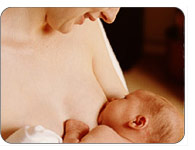Exclusive Breastfeeding: The First Six Months
 The World Health Organization advises that mothers breastfeed their children exclusively for the first six months of life and continue breastfeeding while foods are introduced for up to 2 years of age. The WHO has stepped in with this powerful prescription for good reason-they estimate that 1.5 million infants die every year because they were not breastfed while millions more suffer from missing out on the many benefits of breastfeeding. So just what is so special about breast milk?
The World Health Organization advises that mothers breastfeed their children exclusively for the first six months of life and continue breastfeeding while foods are introduced for up to 2 years of age. The WHO has stepped in with this powerful prescription for good reason-they estimate that 1.5 million infants die every year because they were not breastfed while millions more suffer from missing out on the many benefits of breastfeeding. So just what is so special about breast milk?
Breast milk contains over 300 ingredients, including white blood cells that fight infections; a group of fatty acids that optimizes your baby's brain development, resulting in a gain of 5 IQ points; a host of antibodies that protects your child from respiratory and intestinal viruses and bacteria; human milk is even used to cure cancer in laboratory animals. Infant formula contains 40 ingredients; there have been 22 recalls on formula for potentially life-threatening circumstances. There is simply no comparison in the benefits bestowed by breastfeeding compared to infant formula.
But if you think your baby is the only one benefiting from your exclusive breastfeeding pact, think again. Exclusive breastfeeding has been shown to act as a 99% effective birth control method, significantly reduces the risk of breast, ovarian and uterine cancers and helps you lose your pregnancy weight. Honestly, what more could you ask for?
Quick Breastfeeding Tips
If you've made the decision to exclusively breastfeed your child, then you're in the market for some breastfeeding tips. Breast feeding is a wonderful way to gain instant secure attachment with your infant. Breastfeeding begins with proper latch on; latch on can make the difference in the comfort and ease with which you feed your baby. The baby's lips should protrude and she should take the entire nipple and most of the areola in her mouth as she feeds. Proper latch on decreases the likelihood of breast engorgement and ensures that your child is being properly nourished.
Once you've attained good latch on, let your infant decide when she's done with feeding. Getting distracted is your cue to either change her to your other breast or that she's satiated. By the way, did you know that breastfeeding also helps babies develop excellent hand-to-eye coordination? Just another perk.
Remember that your infant needs to feed approximately every 2-3 hours, and so consider sleeping arrangements such as co-sleeping that make breastfeeding easier and encourage close attachment. Also, when you start introducing food into your infant's diet, remember that it's beneficial to keep breastfeeding until your infant is one year old. We wish you luck in your breastfeeding!
As a new mom, you probably have lots of questions and concerns about breastfeeding. Talking with others in our online forums can help!
For more information check out our videos on child care and breastfeeding.
